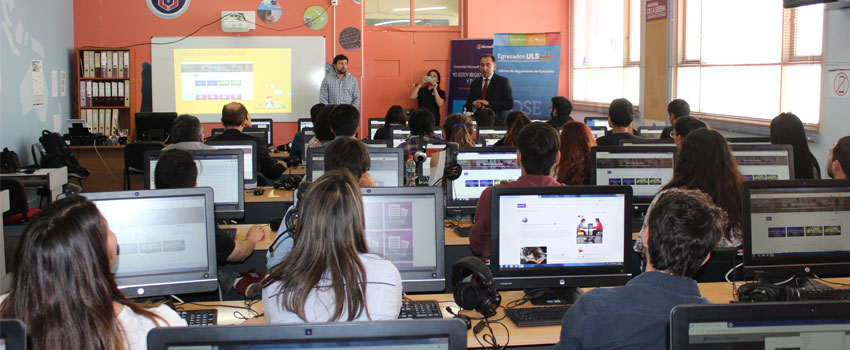
The initiative was born from collaborative work between the Directorate of Institutional Studies and Planning and Microsoft to support the PMI FIPULS Institutional Improvement Plan for pedagogies.
For the second consecutive year, “Hack your class” was held, a training session that Microsoft professionals carried out for teachers belonging to the University of La Serena, where they had the opportunity to update knowledge and learn new techniques, in order to apply them in classroom and offer it as innovative material to its students.
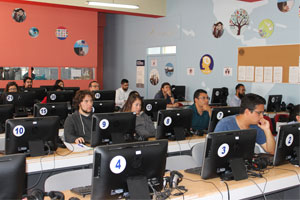 This training, which was jointly organized by the Graduate Monitoring Office and Microsoft, was part of the cooperative work carried out by the Directorate of Institutional Studies and Planning and the multinational technology company, which since 2017 has cooperated with different projects. intended for the implementation of new technologies and learning processes to the educational community of the University of La Serena.
This training, which was jointly organized by the Graduate Monitoring Office and Microsoft, was part of the cooperative work carried out by the Directorate of Institutional Studies and Planning and the multinational technology company, which since 2017 has cooperated with different projects. intended for the implementation of new technologies and learning processes to the educational community of the University of La Serena.
The Microsoft professionals who gave the talks were present on the occasion, as well as the person in charge of the Chilean Education Community, Raimundo Valenzuela, who was emphatic in emphasizing the commitment that the organization has adopted with the teachers and students of pedagogy, ensuring that " As a company we seek to empower students and teachers around the world to achieve more through technology. That is why we look for these types of instances in order to bring teachers from all regions of Chile closer to educational innovation, so that they dare to enhance learning with technology and manage to inspire students.”
The Director of Institutional Studies and Planning, Mg., was also present at one of the sessions. César Espíndola, who assured that this work is carried out within the framework of the University's policies of continuous improvement and links with the regional and national environment, and added that these instances not only benefit ULS teachers but also graduates. of the pedagogies, who were interested in participating in this transfer event.
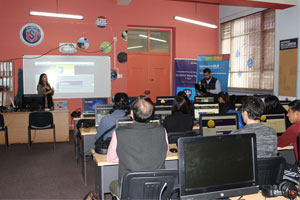 The teachers received this training in an intensive day in blocks, where they were able to learn about technology that can be incorporated to stimulate new ideas in the class process.
The teachers received this training in an intensive day in blocks, where they were able to learn about technology that can be incorporated to stimulate new ideas in the class process.
ULS teachers and pedagogy graduates learned about the OneNote system that facilitates note-taking, information collection and multi-user collaboration, and offers the possibility of adding drawings, diagrams, photographs, multimedia elements, video and scanned images.
“We know the importance of education and how innovation positively impacts the lives of Chilean students. That is why we will continue working with Chilean teachers so that they can empower themselves and continue inspiring thousands of students in Chile with the aim of preparing them for the world of tomorrow,” said Microsoft professional, María José Correa.
Microsoft has already trained more than 7 teachers from different institutions in the country and has led for a couple of years the global initiative called Hack The Classroom, which seeks to encourage teachers from around the world to innovate.

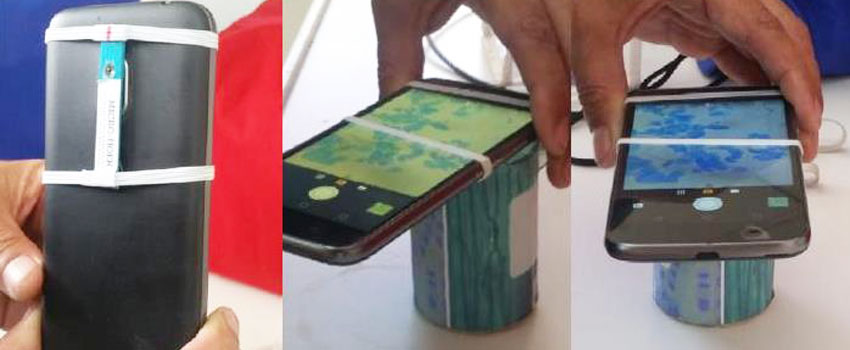
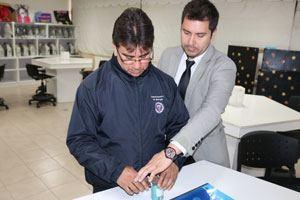 Given this background and as a way to contribute to the teaching and learning of microscopic biology in public educational establishments, both urban and rural, in the Coquimbo Region, and taking into account the new curricular bases and study programs of the MINEDUC , the specialized technician Edgardo Mundaca, and the professor of Biology and Natural Sciences, Mariano Rodríguez, with the sponsorship of the Research and Development Directorate (dependent on the Vice-Rector's Office for Research and Postgraduate Studies) and the Department of Biology of the University of La Serena , designed and created a smartphone adapter, made from electronic and household waste, that allows microscopic images to be captured.
Given this background and as a way to contribute to the teaching and learning of microscopic biology in public educational establishments, both urban and rural, in the Coquimbo Region, and taking into account the new curricular bases and study programs of the MINEDUC , the specialized technician Edgardo Mundaca, and the professor of Biology and Natural Sciences, Mariano Rodríguez, with the sponsorship of the Research and Development Directorate (dependent on the Vice-Rector's Office for Research and Postgraduate Studies) and the Department of Biology of the University of La Serena , designed and created a smartphone adapter, made from electronic and household waste, that allows microscopic images to be captured.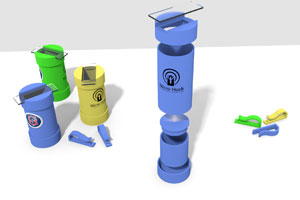 “88% of schools in Latin America do not have laboratory implementation. "This means that there is low scientific literacy," said Mariano Rodríguez, a graduate from the state campus, who added that the low-cost prototype could be used as a technological tool for teaching microscopic biology in the second basic cycle (5th grade). , 6th, 7th and 8th grade).
“88% of schools in Latin America do not have laboratory implementation. "This means that there is low scientific literacy," said Mariano Rodríguez, a graduate from the state campus, who added that the low-cost prototype could be used as a technological tool for teaching microscopic biology in the second basic cycle (5th grade). , 6th, 7th and 8th grade). 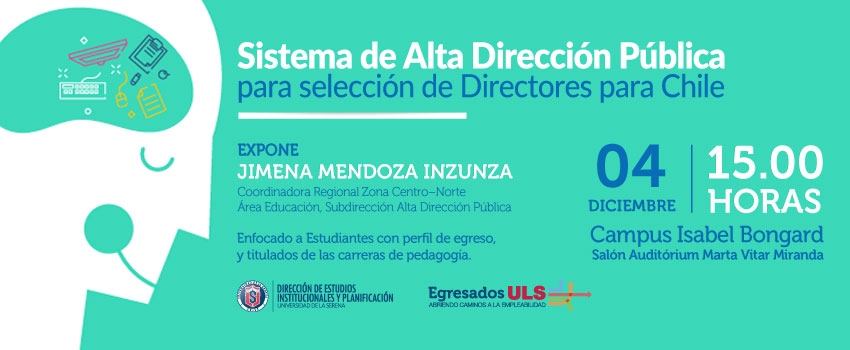
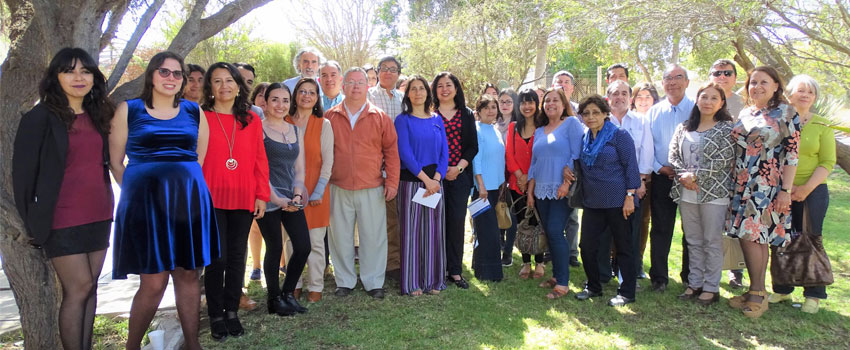
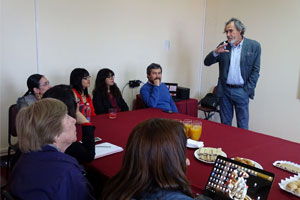
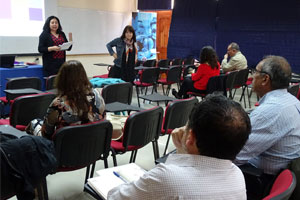 “Innovating involves a certain clarity of what one wants to achieve, introducing a new element into a specific activity. When we talk about innovation, we are talking about an improvement or a change in which a new element is introduced that has to be implemented. If it does not produce an improvement, it is not an innovation, which must be effective and possible to disseminate (reproduce). So why innovate in the teaching of training of trainers? Well, to improve that object, processes and results,” explained Dr. Milos.
“Innovating involves a certain clarity of what one wants to achieve, introducing a new element into a specific activity. When we talk about innovation, we are talking about an improvement or a change in which a new element is introduced that has to be implemented. If it does not produce an improvement, it is not an innovation, which must be effective and possible to disseminate (reproduce). So why innovate in the teaching of training of trainers? Well, to improve that object, processes and results,” explained Dr. Milos.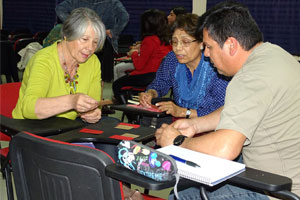 In this way, the activities allowed the development of spaces for updating and deepening in topics of university teaching, didactics, innovation and work practices both for the students of the two diplomas, as well as for the UGIP professionals who participate in related academic work. It should be noted that these updating activities are part of the actions of the Institutional Improvement Project (PMI FIP ULS1501) related to strengthening the training and updating of the institution's academic body, which must be consistent with the new curricular approach to ULS pedagogy courses that begin in 2019.
In this way, the activities allowed the development of spaces for updating and deepening in topics of university teaching, didactics, innovation and work practices both for the students of the two diplomas, as well as for the UGIP professionals who participate in related academic work. It should be noted that these updating activities are part of the actions of the Institutional Improvement Project (PMI FIP ULS1501) related to strengthening the training and updating of the institution's academic body, which must be consistent with the new curricular approach to ULS pedagogy courses that begin in 2019.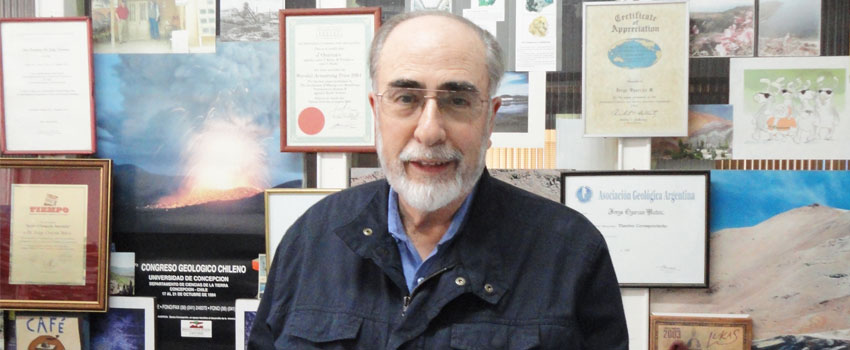
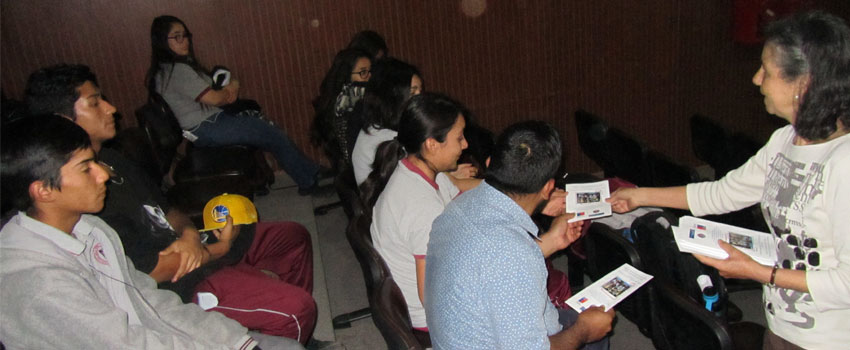
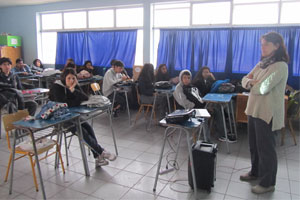 The first, on Tuesday, October 23, was held at the Pedro Aguirre Cerda College of the Arts in La Antena, La Serena; and the second, on Tuesday, November 6, was offered to a group of students from the Pedro Regalado Videla Órdenes High School, at the Casa del Encuentro Ciudadano de Andacollo.
The first, on Tuesday, October 23, was held at the Pedro Aguirre Cerda College of the Arts in La Antena, La Serena; and the second, on Tuesday, November 6, was offered to a group of students from the Pedro Regalado Videla Órdenes High School, at the Casa del Encuentro Ciudadano de Andacollo.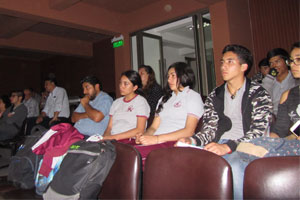 Finally, the talks ended by addressing devotion, a relevant aspect, present in all the rituality of these dances, manifested in a deep faith of the promising adults, as well as projected in boys and girls who dance, sing and/or They play instruments as an expression of prayers and/or thanks to the Virgin.
Finally, the talks ended by addressing devotion, a relevant aspect, present in all the rituality of these dances, manifested in a deep faith of the promising adults, as well as projected in boys and girls who dance, sing and/or They play instruments as an expression of prayers and/or thanks to the Virgin.